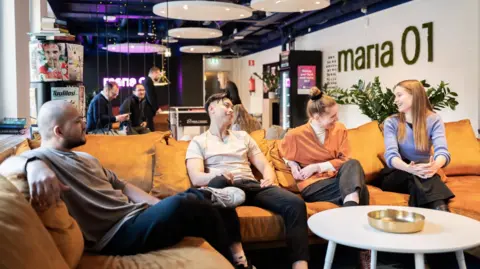In recent developments, Finland is rising in the European start-up scene, with ambitious plans to solidify its position as a leading hub for innovation. Key to this expansion is the project surrounding Maria 01, a collaborative space in Helsinki that aims to become the largest start-up campus in Europe. This initiative is witnessing the transformation of a once-historical site, formerly a hospital, into a modern ecosystem thriving with innovation and entrepreneurship.
Maria 01 serves as a pivotal co-working space for a diverse range of entrepreneurs and tech companies, hosting around 240 start-ups. The hub spans about 20,000 square meters, accommodating various sectors including health technology, artificial intelligence, cybersecurity, gaming, and defense tech. According to Sarita Runeberg, CEO of Maria 01, the goal of the facility is to foster a strong sense of community. This community-centric environment encourages networking among entrepreneurs, allowing them to access various resources essential for business growth. Alongside its dynamic working space, Maria 01 also offers recreational perks, including gaming facilities and, quintessentially Finnish, a sauna, reflecting the nation’s culture and lifestyle.
The expansion plan for Maria 01 includes three new buildings, which are projected to be completed by 2028, and will add an impressive 50,000 square meters of usable space. This initiative is set to launch an accelerator program aimed at supporting high-growth start-ups, providing them with critical guidance and resources for development. Impressively, the current and former members of the hub have collectively raised over €1 billion, approximately 40% of the early-stage funding acquired annually by Finnish start-ups, a testament to the thriving entrepreneurial environment that Maria 01 nurtures.
While Finland’s ecosystem is growing and evolving, it has already birthed twelve unicorns in recent years, including notable names like Oura, Supercell, and Wolt. These successes contribute to Finland being ranked 7th in the start-up ecosystem in Western Europe and 14th globally, according to Startup Blink’s latest index. This ranking highlights the importance of infrastructure like Maria 01, substantial governmental and university support, and annual events such as Slush, a significant gathering for start-ups and investors.
Despite the growing prominence of Finnish start-ups, obstacles remain. Compared to established tech hubs in Sweden, which has considerably more unicorns and greater financial inflow into its ecosystems, Finland is making strides but still has room to strengthen its global presence. Sweden stands out with over 40 unicorns and vast funding, attracting upwards of $29 billion in the last decade, far surpassing Finland’s over $8 billion.
The Finnish government, under a right-wing coalition that came to power in 2023, is making concerted efforts to enhance the local start-up ecosystem. Business Finland, the state agency that endorses investment and innovation, has reported significant increases in funding to start-ups, with investments climbing by 30% in the past year alone. The government is focused on not merely boosting rankings but cultivating an environment where groundbreaking ideas can blossom and address global challenges.
Moreover, to attract international talent, Finland is offering start-up permits and a soft-landing package for foreign entrepreneurs, fostering an inclusive atmosphere conducive to growth. This package comprises advisory services, grants, and support for navigating the initiation phase of business establishment in Finland. Additionally, lifestyle factors are pivotal; the nation emphasizes well-being, free education, and subsidized healthcare, making it an attractive destination for entrepreneurs seeking work-life balance.
While Finland’s advancements in the tech space are notable, concerns persist regarding public support for start-ups. A recent survey revealed diminishing satisfaction among small and medium enterprise owners towards governmental actions, attributed to increasing taxes and more stringent citizenship requirements for foreign entrepreneurs. This evolving landscape necessitates prudent consideration and adaptation to retain its appeal to both local and international talent.
As entrepreneurs like Jack Parker articulate, the unique charm of Finland lies in its close-knit community feeling. However, scaling that community while retaining its “small-town” advantages poses a potential challenge for the future. Balancing growth with the intrinsic qualities that make the Finnish start-up ecosystem unique will be crucial as Finland forges ahead in its bid for European dominance in the start-up arena.











